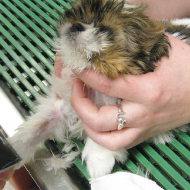Study considers improving tolerance of intravenous catheterisation

Image (C) BSAVA Manual of Canine and Feline Emergency and Critical Care.
New research on improving the tolerance of intravenous catheterisation in emergency patients has found no significant difference when using vapocoolant spray than a saline control.
Studying canine and feline patients, researchers aimed to determine whether applying vapocoolant spray before inserting an intravenous catheter resulted in a reduced reaction and placement success.
Client-owned cats and dogs presenting as emergencies were used in the randomised control trial, and patients were randomly allocated to a swab saturated with vapocoolant spray or a swab saturated with saline before intravenous catheterisation.
For each patient, a video recording was taken of the swab application and the catheterisation, and these were reviewed by a single blinded observer, who assigned reaction scores. These scores (0 to 3) were assigned at four time points in the recording, initial restraint, limb handling, swab application and skin puncture.
The indirect application of vapocoolant spray before catheterisation via a swab did not have any significant effect on the reactions of the dogs and cats. It also did not appear to improve the success rates of placement.
In canine patients, the study showed a significantly greater adverse response to the application of the vapocoolant swab in comparison to the saline control. Feline patients demonstrated adverse reactions to both.
Published in the Journal of Small Animal Practice (JSAP), 'The efficacy of vapocoolant spray for the improved tolerance of catheter pain in emergency patients' is available to read here, but is behind a paywall for non-BSAVA members.
Nicola Di Girolamo, editor of JSAP, commented: “Pragmatic, adequately-powered, randomised controlled trials like the one presented here are essential to evaluate whether an intervention is not only efficacious in a controlled environment, but also effective during clinical practice.”



 The Veterinary Medicines Directorate (VMD) is inviting applications from veterinary students to attend a one-week extramural studies (EMS) placement in July 2026.
The Veterinary Medicines Directorate (VMD) is inviting applications from veterinary students to attend a one-week extramural studies (EMS) placement in July 2026.